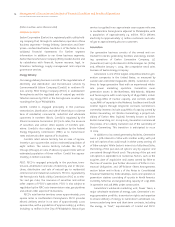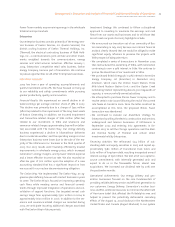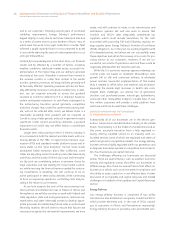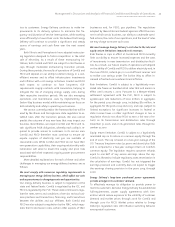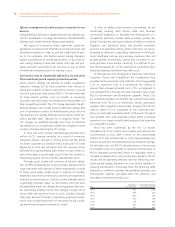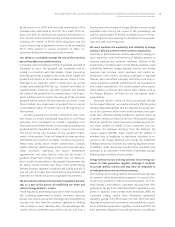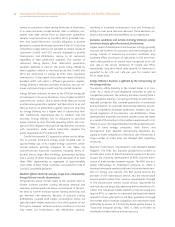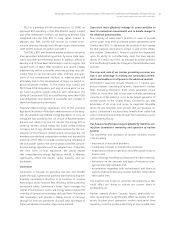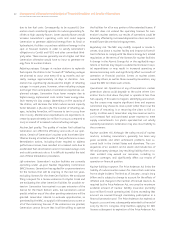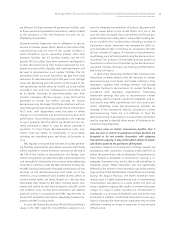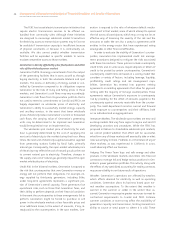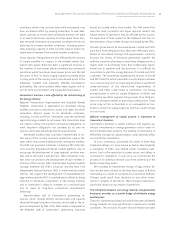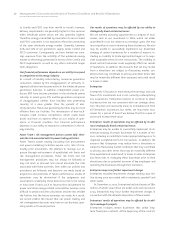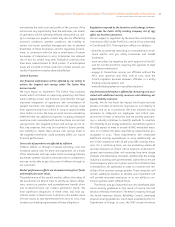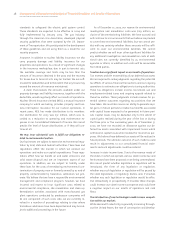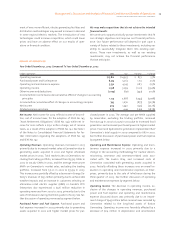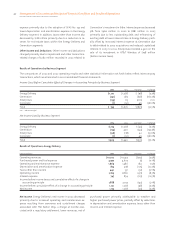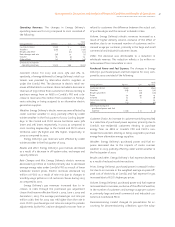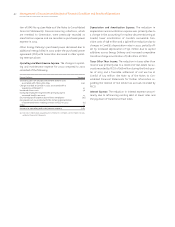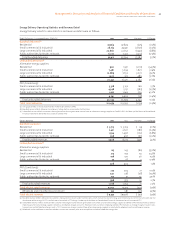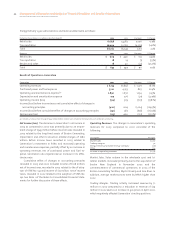ComEd 2003 Annual Report Download - page 36
Download and view the complete annual report
Please find page 36 of the 2003 ComEd annual report below. You can navigate through the pages in the report by either clicking on the pages listed below, or by using the keyword search tool below to find specific information within the annual report.34 Management’s Discussion and Analysis of Financial Condition and Results of Operations
EXELON CORPORATION AND SUBSIDIARY COMPANIES
The FERC has issued electric transmission initiatives that
require electric transmission services to be offered un-
bundled from commodity sales. Although these initiatives
are designed to encourage wholesale market transactions
for electricity, access to transmission systems may in fact not
be available if transmission capacity is insufficient because
of physical constraints or because it is contractually un-
available. We also cannot predict whether transmission
facilities will be expanded in specific markets to accom-
modate competitive access to those markets.
Generation is directly affected by price fluctuations and other
risks of the wholesale power market.
Generation fulfills its energy commitments from the output
of the generating facilities that it owns as well as through
buying electricity in both the wholesale bilateral and spot
markets. The excess or deficiency of energy owned or con-
trolled by Generation compared to its obligations exposes
Generation to the risks of rising and falling prices in those
markets, and Generation’s cash flows may vary accordingly.
Generation’s cash flows from its generation portfolio that is
not used to meet its commitments to ComEd and PECO are
largely dependent on wholesale prices of electricity and
Generation’s ability to successfully market energy, capacity
and ancillary services. In the event that lower wholesale
prices of electricity reduce Generation’s current or forecasted
cash flows, the carrying value of Generation’s generating
units may be determined to be impaired and Generation
would be required to incur an impairment loss.
The wholesale spot market price of electricity for each
hour is generally determined by the cost of supplying the
next unit of electricity to the market during that hour. Many
times, the next unit of electricity supplied would be supplied
from generating stations fueled by fossil fuels, primarily
natural gas. Consequently, the open-market wholesale price
of electricity may reflect the cost of natural gas plus the cost
to convert natural gas to electricity. Therefore, changes in
the supply and cost of natural gas generally impact the open
market wholesale price of electricity.
Credit Risk. In the bilateral markets, Generation is exposed to
the risk that counterparties that owe Generation money or
energy will not perform their obligations. For example, en-
ergy supplied by third-party generators, including Sithe,
under long-term agreements represents a significant por-
tion of Generation’s overall capacity. These generators face
operational risks, such as those that Generation faces, and
their ability to perform depends on their financial condition.
In the event the counterparties to these arrangements fail to
perform, Generation might be forced to purchase or sell
power in the wholesale markets at less favorable prices and
incur additional losses, to the extent of amounts, if any, al-
ready paid to the counterparties. In the spot markets, Gen-
eration is exposed to the risks of whatever default mecha-
nisms exist in that market, some of which attempt to spread
the risk across all participants, which may or may not be an
effective way of lessening the severity of the risk and the
amounts at stake. We are also a party to agreements with
entities in the energy sector that have experienced rating
downgrades or other financial difficulties.
In order to evaluate the viability of Generation’s counter-
parties, Generation has implemented credit risk manage-
ment procedures designed to mitigate the risks associated
with these transactions. These policies include counterparty
credit limits and, in some cases, require deposits or letters of
credit to be posted by certain counterparties. Generation’s
counterparty credit limits are based on a scoring model that
considers a variety of factors, including leverage, liquidity,
profitability, credit ratings and risk management capa-
bilities. Generation has entered into payment netting
agreements or enabling agreements that allow for payment
netting with the majority of its large counterparties. These
agreements reduce Generation’s exposure to counterparty
risk by providing for the offset of amounts payable to the
counterparty against amounts receivable from the counter-
party. The credit department monitors current and forward
credit exposure to counterparties and their affiliates, both
on an individual and an aggregate basis.
Immature Markets. The wholesale spot markets are new and
evolving markets that vary from region to region and are still
developing practices and procedures. While the FERC has
proposed initiatives to standardize wholesale spot markets,
we cannot predict whether that effort will be successful,
what form any of these markets will eventually take or what
roles we will play in them. Problems in or the failure of any of
these markets, as was experienced in California in 2000,
could adversely affect our business.
Hedging. The Power Team buys and sells energy and other
products in the wholesale markets and enters into financial
contracts to manage risk and hedge various positions in Gen-
eration’s power generation portfolios. This activity, along with
the effects of any specialized accounting for trading contracts,
may cause volatility in our future results of operations.
Weather. Generation’s operations are affected by weather,
which affects demand for electricity as well as operating
conditions. Generation plans its business based upon nor-
mal weather assumptions. To the extent that weather is
warmer in the summer or colder in the winter than as-
sumed, Generation may require greater resources to meet its
contractual requirements to ComEd and PECO. Extreme
summer conditions or storms may affect the availability of
generation capacity and transmission, limiting Generation’s
ability to source or send power to where it is sold. These


